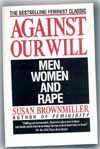She Said, She Said: the misinterpretation of Susan Brownmiller on anatomy and rape

Feminism — and I mean radical feminism here, although much of what I’ll mention has been inflicted on socialist and liberal feminists too — is not a matter of little-known historical arcana. It’s a vibrant movement that has had world-shaking consequences within the living memory of most adults. So it’s sad, to say the least, that the history of feminism over the past 35 years has been almost entirely enveloped in a fog of historical amnesia; that the recent history of the movement is simply not discussed in schools or the press, and that legions of blowhard self-proclaimed experts
(take Nicholas Kristof — please!) feel free to weigh in periodically on feminist works and feminist organizing without actually bothering to find out what the feminists they are attacking actually said or did.
Now, I don’t care very much about setting straight the Kristofs of the world; but one unfortunate result of the memory-hole treatment of radical feminism is that there are a lot of distorted critiques of particular radical feminists running around, which seep into the writing even of those who want to give fair and sympathetic historical accounts. It’s understandable that this should happen: if you’re trying to give a survey view of feminist history, you couldn’t possibly read every single feminist work that will be touched on; you’re inevitably going to rely on some glosses from other sources, and if those glosses are inaccurate then those inaccuracies will creep into your work without you realizing it. Nevertheless, understandable errors are still errors; and I hope that they can be set straight.
Consider the case of Susan Brownmiller, the New York radical feminist journalist who is best known for her landmark work on rape, Against Our Will: Men, Women, and Rape. Her work is remarkable, ground-breaking, vitally important, and also, at times, flawed. There are, to be sure, reasons to disagree with Brownmiller; but this is not one of them:
Of course, there have been a number of feminists who, disturbed by what they saw as an assimilationist tendency in feminism, asserted a more positive notion of femininity that was, at times, undoubtedly essentialist. Susan Brownmiller, in her important book Against Our Wills, suggested that men may be genetically predisposed to rape, a notion that has been echoed by Andrea Dworkin.
— Pendleton Vandiver, Feminism: A Male Anarchist’s Perspective [Infoshop.org]
Or:
Against Our Will was controversial from the moment it was published. In it Brownmiller advances the theory that rape is biologically determined. Because she called attention to anatomy as the basis of rape, she was accused of letting men off the hook, and, more recently, her work has been picked up by conservatives to undermine the antirape movement.
–Rosalyn Baxandall and Linda Gordon, Second Wave Soundings [The Nation]
But the criticism here is a bit off-base, because, well, Susan Brownmiller never said anything of the sort.
Brownmiller has argued at length against biologistic accounts of rape. She argues against them in Against Our Will; she argued against them again in her smack-down review of Craig Palmer and Randy Thornhill’s A Natural History of Rape.

Where did this misunderstanding of Brownmiller come about? It seems to be based on a brief passage toward the end of the first chapter of Against Our Will, where she says:
Man’s structural capacity to rape and woman’s corresponding structural vulnerability are as basic to the physiology of both our sexes as the primal act of sex itself. Had it not been for this accident of biology, an accomodation requiring the locking together of two separate parts, penis into vagina, there would be neither copulation nor rape as we know it. Anatomically one might want to improve on the design of nature, but such speculation appears to my mind as unrealistic. The human sex act accomplishes its historic purpose of generation of the species and it also affords some intimacy and pleasure. I have no basic quarrel with the procedure. But, nevertheless, we cannot work around the fact that in terms of human anatomy the possibliity of forcible intercourse incontrovertibly exists. This single factor may have been sufficient to have caused the creation of a male ideology of rape. When men discovered they could rape, they proceeded to do it.
–Susan Brownmiller, Against Our Will pp. 13–14
But all that Brownmiller is saying here is that it is a fact of physiology that it is anatomically possible for men to rape women; and that is obviously true, since anatomically impossible things don’t usually happen. She goes on to argue throughout Against Our Will that rape is not a biologically foreordained fact; it is a political choice that men use against women because they benefit from the power that it gives them. As she writes just a few paragraphs later:
Man’s discovery that his genitalia could serve as a weapon to generate fear must rank as one of the most important discoveries of prehistoric times, along with the use of fire and the first crude stone axe. From prehistoric times to the present, I believe, rape has played a critical function. It is nothing more or less than a conscious process of intimidation by which all men keep all women in a state of fear.
–Susan Brownmiller, Against Our Will pp. 14–15
That is a straightforwardly materialist theory: rape and the threat of rape are taken to be instruments of power that men choose to use against women because men benefit from it at women’s expense. Whether it is the correct theory or an incorrect theory, it is certainly not a biological determinist theory about rape (much less a specifically genetic theory).
These inaccurate criticisms of Brownmiller aren’t coming from Cathy Young-style charlatans. Vandiver is well-versed in feminist history, and trying to give a sympathetic survey of recent feminist history for anarchists; Baxandall and Gordon are the editors of Dear Sisters: Dispatches from the Women’s Liberation Movement, an absolutely indispensible compilation of historical material from radical and socialist feminists in the first decade of the Second Wave. Unfortunately the patina of distortions spread over the real history of feminism by uncharitable critics sometimes also trips up those of us who are sympathetic and want to get a clearer understanding of it. Here’s hoping this post has helped us get a step forward towards clarity.






